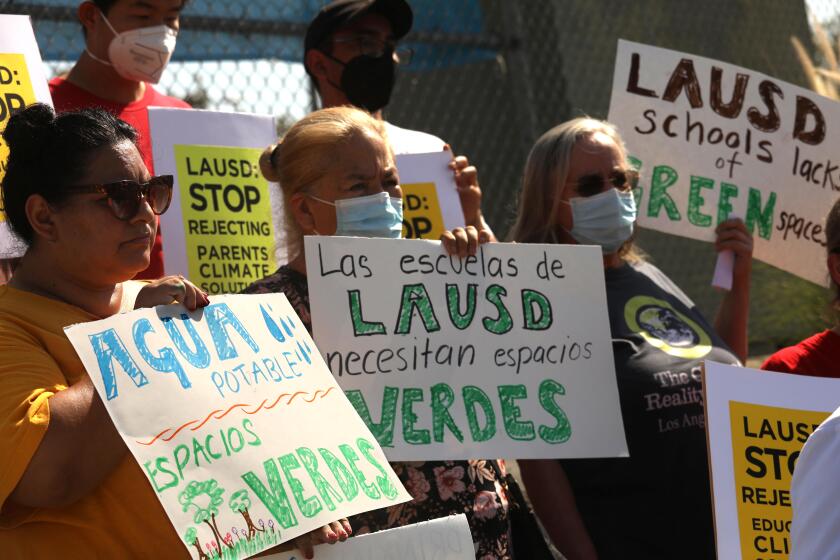Feed the homeless, go to jail?
- Share via
It’s Philly, all right, but hold the Philly cheese steak — at least from the menu for the homeless.
The ACLU has sued the City of Brotherly Love for not being loving or brotherly enough with its ban on the outdoor feeding of the homeless, which took effect this month. The Philadelphia Weekly points out that the ban grew out of the Occupy movement, which began giving food to the homeless without benefit of food safety standards.
Philadelphia joins the list of municipalities that have banned or restricted feeding the homeless in public, at the very moment when public funds for homeless services are going on a starvation diet. Atlanta to San Diego, Miami to L.A., Oklahoma City to Phoenix and a few dozen other cities, anti-camping or anti-food-sharing laws have been put in place.
But why? Did I miss out on something? A wave of poisonings of the homeless by evildoers posing as the good-hearted? Flash mobs of homeless gourmet clubs, feasting on leftovers? Here’s Matt Pearce’s report on the wave of laws at issue.
I’m wondering what the premise is here. If you don’t feed them, they won’t come? They won’t be homeless?
And is it possible that kind-hearted organizations and generous-minded people could be ticketed or even threatened with jail for trying to do a loaves-and-fishes number? Yes, it’s evidently happened already.
The amount of food we Americans leave on our plates, the food that stores throw into garbage bins because of just-passed sell-by dates, is so monumental that it might be able to remedy much of the hunger in the country by matching the hungry with available food. It’s a matter of logistics. At Christmas and at Thanksgiving and Easter, organized meals for the homeless draw volunteers and celebrities, but for the other 360-something days a year, the challenge of getting the homeless to the food is also sometimes about getting the food to the homeless.
The ACLU sued Las Vegas over a 2006 ban on feeding the homeless, which reportedly ended up with nonprofit organizations and individuals actually getting arrested for feeding people who appeared to be poor, in groups of two dozen homeless or more; gatherings of more than 25 in Vegas’ public parks required permits. The legal settlement requires police to see actual unlawful activity — not just arrest or ticket for the act of feeding itself.
In New York, an official in the administration of Mayor Michael Bloomberg, he of the big-gulp soda ban, has said it’s too hard to figure out what might be in donated food — fat, salt, calories – that might do more harm to the homeless than good.
In Dallas, new regulations are meant “to ensure the safety of the providers, the food, and the recipients” and now requires that those handing out food register to be “certified in a Food Handler’s Class.”
USA Today quoted one of the Philly mayor’s spokesmen as saying that city’s ban is about “dignity,” because people deserve “something more than getting a ham sandwich out on the side of the street.”
Well, sure. But until that happens, maybe a sandwich on the fly is all they can get.
I can understand that the cities don’t want to create attractive nuisances, or create a permanent outdoor picnic in parks that may keep away other park patrons, or give the homeless food that’s no better for them than the junk they may already have to resort to. And that people who may have to scrounge in the garbage to eat shouldn’t be given garbage under someone’s pretext of charity. And municipal lawyers must be kept up at night imagining the liability of food poisoning if the city doesn’t try to set some ground rules.
But where does this all go, and where does it end? I often take restaurant leftovers — mine, and my friends’ — and if I see someone begging I’ll ask if they’d like a meal. Nine times out of 10 they do. Could I get busted for that?
I think I have a solution.
Don’t give away the food. Sell it. For a penny.
Tape one cent to the underside of every plate at every food distribution. The homeless person then goes through the motions of handing the penny back, and voila! A transaction.
It’s not charity, it’s commerce. And what could be more American than that?
RELATED:
Full coverage: Homeless in America
Feeding bans: Well-meaning or war on the poor?L.A. County project pays off for homeless and taxpayers
More to Read
A cure for the common opinion
Get thought-provoking perspectives with our weekly newsletter.
You may occasionally receive promotional content from the Los Angeles Times.










